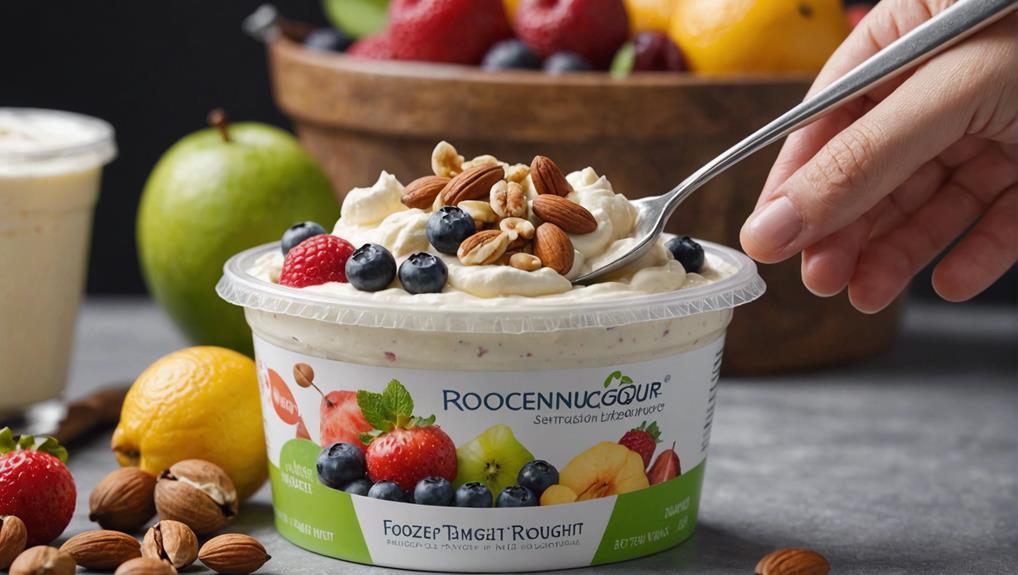Frozen yogurt can be a valuable addition to a weight management plan due to its lower calorie and fat content compared to ice cream. It offers nutritional benefits like probiotics for digestive health and calcium for bone strength. Greek frozen yogurt, with higher protein and lower fat, is particularly beneficial. However, it's essential to review nutritional information and practice portion control to avoid high sugar variants. Healthy toppings like fresh fruit and chia seeds can enhance its nutritional profile. Additionally, homemade variations allow for complete control over ingredients. Explore further insights to maximize the benefits of frozen yogurt in your diet.
Key Takeaways
- Lower Calorie Alternative: Frozen yogurt typically has fewer calories and fat compared to traditional ice cream, making it a better option for weight management.
- High Protein Content: Opt for Greek frozen yogurt as it contains higher protein levels, which can help maintain muscle mass and support weight loss.
- Live Probiotic Cultures: Choose yogurt with live probiotics to support gut health, which can aid in overall wellness and weight management.
- Portion Control: Stick to smaller servings and use portion control techniques to prevent overeating and maintain a balanced diet.
- Healthy Toppings: Enhance your frozen yogurt with fresh fruit, chia seeds, or dark chocolate for added nutrients without excessive calories.
Nutritional Benefits

Frozen yogurt offers a range of nutritional benefits that make it a viable option for those seeking a healthier dessert alternative to support weight management. One of the key advantages of frozen yogurt over traditional ice cream is its lower calorie and fat content. Reduced calories and fat can play an important role in maintaining or achieving a healthy weight, as excessive intake of these nutrients is often linked to weight gain. For instance, a typical serving of frozen yogurt contains notably fewer calories and less fat compared to a similar serving of ice cream, making it a more diet-friendly choice.
In addition, frozen yogurt often contains live probiotic cultures, which are beneficial for digestive health. These probiotics can enhance gut health, potentially improving digestion and contributing to overall well-being. Another significant nutritional aspect is that frozen yogurt can be a good source of calcium. Adequate calcium intake is essential for maintaining strong bones and may also assist in weight management. Moreover, choosing Greek frozen yogurt can provide even more nutritional benefits, such as higher protein content and lower fat, which can aid in satiety and help control appetite. Incorporating frozen yogurt in moderation can therefore support weight management goals while satisfying sweet cravings.
Choosing the Right Type
When considering frozen yogurt as a part of a weight management plan, selecting the right type is essential to maximizing its nutritional benefits. One of the most advantageous options is Greek frozen yogurt, renowned for its higher protein content and lower fat compared to traditional varieties. The increased protein not only aids in satiety but also supports muscle maintenance, which is beneficial for weight loss.
Additionally, choosing frozen yogurt with live probiotic cultures can support gut health and enhance digestion, further contributing to a well-rounded weight management strategy. Probiotics have been shown to balance gut flora, which can have positive effects on metabolism and overall digestive function.
It's also important to review the nutritional information when selecting frozen yogurt. Opt for versions with lower calories and fat to align with your weight management goals. This involves scrutinizing labels to make sure you're making informed decisions that support your dietary objectives.
Lastly, practicing portion control is vital. Even the healthiest frozen yogurt can contribute to weight gain if consumed in large quantities. Choosing smaller serving sizes helps manage calorie intake effectively, making frozen yogurt a viable treat within a balanced diet.
Avoiding High-Sugar Options

High-sugar content in yogurt can undermine weight management efforts by causing spikes in blood sugar levels and increasing overall caloric intake. Consuming frozen yogurt with excessive sugar can negate its potential benefits, making it essential to scrutinize the sugar content on labels. Non-fat yogurt varieties often compensate for the lack of fat by adding more sugar, which can be detrimental to your health and counterproductive for weight management.
Opting for yogurt with moderate fat content can aid in satiety, helping to prevent overeating. Fat in yogurt can contribute to a feeling of fullness, reducing the likelihood of consuming additional calories from other sources. Therefore, it is advisable to choose yogurt with a balanced sugar content and moderate fat levels to better manage overall sugar intake.
Avoiding sugar-free options, which may contain artificial sweeteners, is also recommended. Artificial sweeteners can sometimes contribute to weight gain and may lead to increased cravings for sweet foods. Instead, focus on finding yogurt that maintains a good balance between natural sugars and fats. This approach supports a sustainable, balanced diet that aligns with long-term weight management goals.
Portion Control Tips
Effective portion control is essential for leveraging the benefits of frozen yogurt in a weight management plan. One practical tip is to opt for smaller serving sizes, which can greatly reduce overall calorie intake. Frozen yogurt, while often lower in calories than traditional ice cream, can still contribute to weight gain if consumed in large quantities. Hence, being mindful of portion control is vital to prevent overconsumption.
Research suggests that practicing moderation by sticking to recommended serving sizes can aid in maintaining a balanced diet. A standard serving size is typically half a cup, which can help keep calorie intake in check. Additionally, using smaller bowls or cups can create the illusion of a more substantial portion, making it easier to feel satisfied with less.
Moreover, limiting the amount of sugary toppings can further enhance portion control. While it is tempting to add high-calorie options, choosing healthier alternatives like fresh fruit can help manage portions effectively. This approach not only controls calorie intake but also adds nutritional value to your dessert. To conclude, thoughtful portion control is a key strategy for incorporating frozen yogurt into a successful weight management plan.
Healthy Toppings

Incorporating healthy toppings into your frozen yogurt can greatly enhance its nutritional profile while keeping calorie intake in check. By selecting toppings that are nutrient-dense and low in calories, you can enjoy a delicious and satisfying dessert without compromising your weight management goals.
To make the most of your frozen yogurt, consider the following healthy toppings:
- Fresh Fruit: Opt for fresh fruit such as berries, bananas, or mango. These fruits not only add natural sweetness but also provide essential vitamins, minerals, and antioxidants.
- Chia Seeds and Coconut Flakes: Adding a sprinkle of chia seeds or unsweetened coconut flakes can boost your intake of fiber and healthy fats, promoting satiety and overall health.
- Dark Chocolate: A small amount of dark chocolate can offer a rich flavor while supplying antioxidants and a lower sugar content compared to milk chocolate.
- Granola or Yogurt Chips: Use granola or yogurt chips sparingly. While they add a pleasant crunch, they can significantly increase the fat and calorie content of your dessert.
Remember to be mindful of portion sizes to maintain a balanced and nutritious treat. By choosing healthy toppings wisely, you can enjoy frozen yogurt as a delicious component of your weight management plan.
Nonfat Vs. Regular
When deciding between nonfat and regular frozen yogurt, it's important to weigh the benefits and drawbacks of each option to determine which aligns best with your dietary goals. Nonfat frozen yogurt is often promoted as a lower-calorie option, but it typically contains thickeners and binders to achieve a desirable texture. This increased processing can result in a product that is less natural compared to its regular counterpart.
Regular frozen yogurt, which contains moderate fat content, can offer several advantages. The presence of fat aids in satiety, potentially helping to prevent overeating. Additionally, the more balanced nutritional profile of regular frozen yogurt can make it a more satisfying dessert option.
Here's a comparative analysis to help you decide:
| Aspect | Nonfat Frozen Yogurt | Regular Frozen Yogurt |
|---|---|---|
| Caloric Content | Lower | Higher |
| Texture | Enhanced by thickeners | Naturally creamy |
| Processing | Often more processed | Less processed |
| Satiety | Less likely to keep you full | More likely to keep you full |
| Dietary Balance | Less balanced | More balanced |
Ultimately, the choice between nonfat vs. regular frozen yogurt should be guided by your personal dietary goals and preferences. If calorie reduction is a priority, nonfat may be suitable; however, for a more satisfying and balanced option, regular frozen yogurt could be the better choice.
Checking Ingredients

An important step in selecting frozen yogurt for weight management is thoroughly examining the ingredient list for any additives and thickeners. Nonfat frozen yogurt often includes thickeners such as carrageenan, cellulose, and guar gum to achieve a desirable texture. While these ingredients can help enhance the mouthfeel of the product, it is essential to understand their implications on overall nutritional quality.
When reviewing ingredient labels, consider the following:
- Identify Thickeners: Look for common thickeners like carrageenan, cellulose, and guar gum. These are often added to improve texture but may indicate a more processed product.
- Assess Safety: Make sure that the additives included are deemed safe for consumption according to regulatory standards.
- Evaluate Nutritional Impact: Be mindful that thickeners, while not inherently harmful, may alter the nutritional profile of the yogurt, potentially adding unnecessary calories or reducing the natural nutrient density.
- Compare Products: Use the ingredient list to compare different frozen yogurt brands and select those with fewer and more recognizable ingredients.
Awareness of these factors can lead to more informed decisions, aligning with weight management goals while enjoying frozen yogurt.
Homemade Alternatives
Exploring homemade alternatives for frozen yogurt can provide a healthier and more customizable option, allowing you to have full control over the ingredients and nutritional content. This approach is particularly beneficial for those focused on weight management, as it enables the use of low fat yogurt and natural sweeteners, thereby reducing calorie intake without sacrificing flavor.
Homemade frozen yogurt offers the flexibility to tailor the dessert to your taste preferences and health goals. By incorporating fresh fruits and natural sweeteners such as honey or stevia, you can enhance the nutritional profile while avoiding the excessive sugars and additives often found in store-bought versions. Additionally, using low fat yogurt as the base can greatly reduce fat content, making it a more suitable choice for those aiming to maintain or lose weight.
Beyond the health benefits, making frozen yogurt at home can be an enjoyable and creative endeavor for individuals and families. Experimenting with different flavors and toppings not only ensures variety but also keeps the dessert exciting and appealing. Ultimately, homemade frozen yogurt stands out as a nutritious and versatile option for anyone looking to manage their weight while still indulging in a delicious treat.
Eating Frequency

When considering the frequency of eating frozen yogurt for weight management, it is crucial to focus on ideal snack timing and portion control strategies. Consuming frozen yogurt as a mid-morning or mid-afternoon snack can help maintain energy levels and prevent overeating at main meals. Additionally, choosing smaller servings and pairing them with protein-rich toppings can enhance satiety while managing calorie intake effectively.
Optimal Snack Timing
Implementing a consistent snack timing regimen, ideally every 3-4 hours, can play a crucial role in weight management by preventing overeating and maintaining energy levels. Snacking on nutrient-dense foods, such as frozen yogurt, can help maintain a balanced diet. This approach guarantees that energy levels remain steady throughout the day, reducing the likelihood of reaching for unhealthy options due to sudden hunger pangs.
Here are some practical benefits of ideal snack timing:
- Prevents Overeating: Regular, balanced snacks can curb hunger, making it easier to control portion sizes during main meals.
- Maintains Energy Levels: Consistent snacking helps sustain energy, preventing the dips that lead to fatigue and poor food choices.
- Regulates Blood Sugar: Eating at regular intervals can help maintain stable blood sugar levels, reducing the risk of energy crashes.
- Promotes Satiety: Nutrient-dense snacks like yogurt provide essential nutrients that promote a feeling of fullness, aiding in weight management.
Incorporating a structured snacking schedule into your daily routine can make a significant impact. Choose balanced snacks that provide a mix of protein, healthy fats, and carbohydrates to support overall health and well-being.
Portion Control Strategies
To further enhance weight management efforts, adopting effective portion control strategies, such as eating smaller, more frequent servings of frozen yogurt, can be highly beneficial. By dividing larger containers into single servings, individuals can better manage their calorie intake, thereby supporting their weight management goals.
Portion control strategies involve accurately measuring serving sizes to prevent overeating. For example, consuming a modest amount of frozen yogurt multiple times a day can help maintain a balanced calorie intake without sacrificing the enjoyment of this treat. This approach can also reduce the likelihood of impulsive eating behaviors that often lead to excessive calorie consumption.
| Portion Control Strategy | Benefit |
|---|---|
| Smaller, frequent servings | Manages calorie intake |
| Measuring serving sizes | Prevents overeating |
| Single-serving portions | Supports weight management |
| Dividing larger containers | Aids in portion control goals |
Incorporating frozen yogurt into a structured eating plan, where portions are controlled and spread out throughout the day, can be a practical and enjoyable way to maintain a healthy diet. This method not only ensures that calorie intake is kept in check but also allows for consistent indulgence in frozen yogurt, making it easier to adhere to weight management objectives.
Frequently Asked Questions
Is Frozen Yogurt Ok for Weight Loss?
Yes, frozen yogurt can be suitable for weight loss if consumed with portion control and sugar alternatives. Incorporating it in moderation, while selecting toppings wisely, can support weight management within a balanced dietary plan.
What Are the Benefits of Eating Frozen Yogurt?
A key benefit of eating frozen yogurt is its potential to support gut health through live probiotic cultures. Additionally, its calcium content aids bone strength. However, portion control is essential to avoid excess calorie consumption.
Is Frozen Yogurt Actually Healthier Than Ice Cream?
Frozen yogurt often has lower fat content than ice cream; however, added sugars can offset these benefits. Portion control is vital to guarantee it remains a healthier option overall, emphasizing moderation and careful selection of brands.
Is Frozen Yogurt a Carb or Protein?
Frozen yogurt can be considered both a carbohydrate and a protein source. The nutritional breakdown, influenced by ingredient variations, reveals its sugar content contributes to carbs while dairy ingredients provide varying protein levels, especially in Greek varieties.
Conclusion
Frozen yogurt, like a double-edged sword, offers both potential benefits and pitfalls for weight management. When wielded wisely, it can be a nutritious ally in the quest for health, provided the right type is chosen, high-sugar options are avoided, and portion control is exercised. Healthy toppings enhance its value, while a careful examination of ingredients guarantees informed choices. Nonfat and regular options, along with homemade alternatives, offer flexibility, but mindful frequency of consumption remains paramount.







